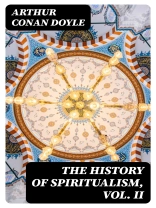In ‘The History of Spiritualism, Vol. II, ‘ Arthur Conan Doyle embarks on a compelling exploration of the spiritualist movement that gained momentum in the late 19th and early 20th centuries. This volume delves into the historical and cultural contexts of spiritualism, examining its philosophical underpinnings and its impact on society. As Doyle intertwines vivid anecdotes with rigorous analysis, he presents a rich tapestry of beliefs, practices, and notable figures, offering insight into the larger metaphysical discourse of the time. His prose is characterized by a combination of analytical rigor and narrative flair, engaging readers both intellectually and emotionally. Arthur Conan Doyle, renowned as the creator of Sherlock Holmes, was deeply influenced by his fascination with the occult and the afterlife, elements that permeate his literary works. His personal experiences with spiritualism, including interactions with prominent mediums and investigations into paranormal occurrences, shaped his perspective on the movement. Doyle’s earnest commitment to the spiritualist cause, driven by a profound loss and search for answers, reinforces his credibility as a defender and chronicler of this complex phenomenon. ‘The History of Spiritualism, Vol. II’ is an essential read for those intrigued by the intersections of literature, spirituality, and history. Doyle’s thoughtful examination invites readers to consider the societal implications of spiritualism and its enduring legacy, making it a valuable text for scholars, enthusiasts, and anyone seeking to understand the human quest for connection beyond the material world.
About the author
Sir Arthur Conan Doyle (1859–1930) was a prolific British author most renowned for his creation of the iconic detective, Sherlock Holmes. His literary work transcends the genre of detective fiction, extending into historical novels, science fiction, plays, poetry, and non-fiction. Conan Doyle was a man of boundless curiosity and interests, which led him to explore spiritualism later in his life, culminating in works such as ‘The History of Spiritualism, Vol. II’ (1926). Conan Doyle, educated as a physician at the University of Edinburgh, infused his writing with meticulous detail and an inductive approach characteristic of his medical training. Although Holmes is his most enduring legacy, Conan Doyle’s foray into spiritualism demonstrates a deep engagement with the metaphysical questions of his time. His literary style, a blend of fast-paced narrative, intricate plots, and vivid characterizations, helped shape the standards of detective fiction and suspense writing. Doctrinaire yet passionate about his belief in the afterlife, his spiritualist writings sought to apply the same empirical rigor he employed in his detective fiction to personal experiences and research on the supernatural. These works offer a fascinating glimpse into the intellectual profile of a writer who was constantly evolving and remain a significant part of his broader literary heritage.












